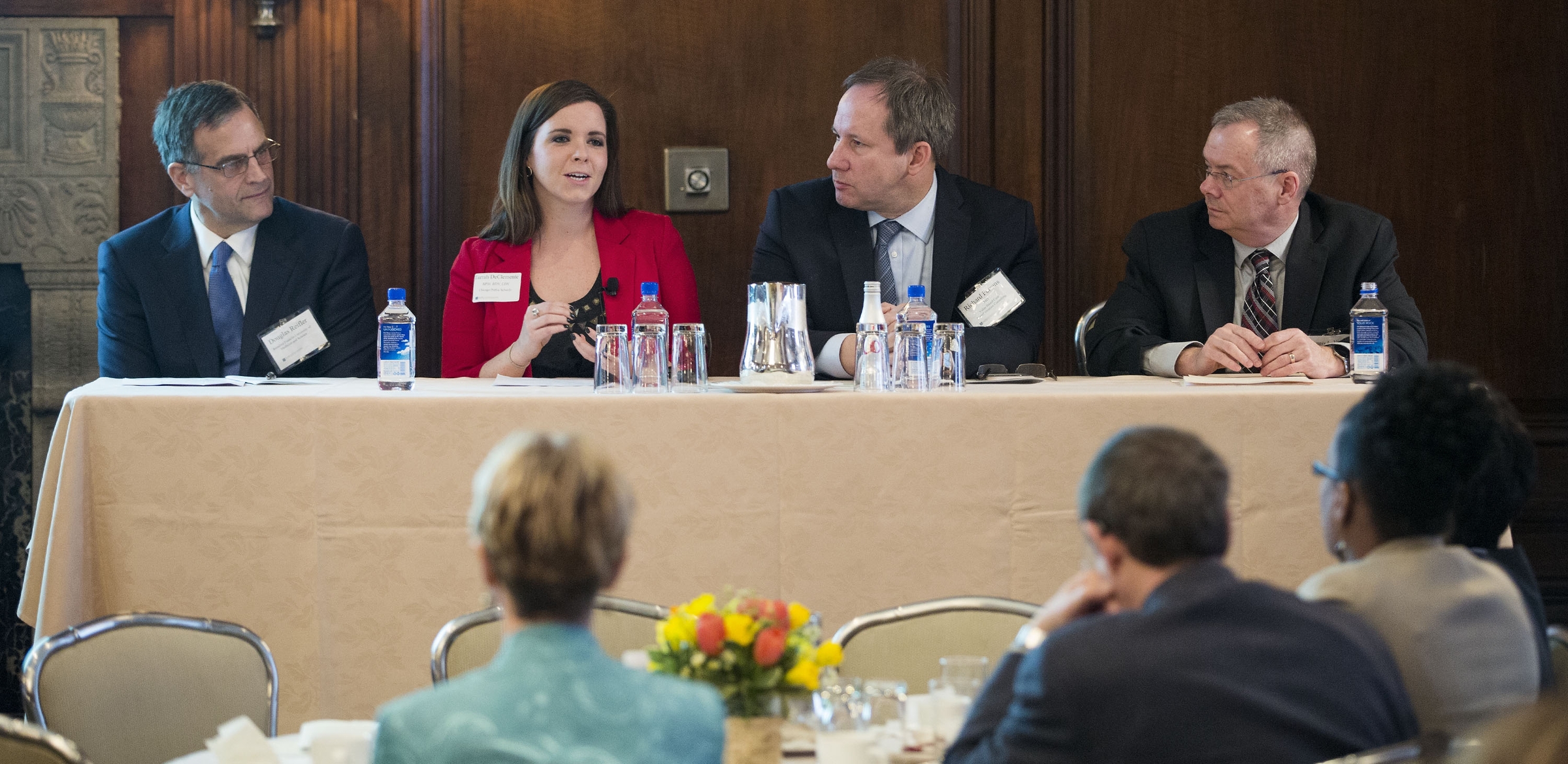 Panelists Dr. Douglas Reifler, Tarrah K. DeClemente, Dr. Richard Ferrans and Dr. Dennis L. Vickers share their interprofessional health care delivery experiences during the William E. Bennett Forum on Innovation in Interprofessional Education and Practice: Pathways to Partnerships. (Photo by Maria Toscano) CHICAGO — Prominent health care educators and professionals gathered at DePaul University March 23 to discuss interprofessional approaches to health care delivery. Leaders in community-based care and primary care, as well as accrediting agencies and academic medical centers, convened for an all-day symposium about how health workers from different disciplines work together to provide care.
Panelists Dr. Douglas Reifler, Tarrah K. DeClemente, Dr. Richard Ferrans and Dr. Dennis L. Vickers share their interprofessional health care delivery experiences during the William E. Bennett Forum on Innovation in Interprofessional Education and Practice: Pathways to Partnerships. (Photo by Maria Toscano) CHICAGO — Prominent health care educators and professionals gathered at DePaul University March 23 to discuss interprofessional approaches to health care delivery. Leaders in community-based care and primary care, as well as accrediting agencies and academic medical centers, convened for an all-day symposium about how health workers from different disciplines work together to provide care.
“DePaul established a strategic alliance with the Rosalind Franklin University of Medicine and Science because we understood how important it is for today’s health care workers to be able to work successfully in team settings. The symposium is a demonstration of our continued commitment to interdisciplinary health care partnerships in the Chicago area,” said the Rev. Dennis H. Holtschneider, C.M., president of DePaul University.
The forum generated discussion about professional development programs that can help the region meet the health care triple aim, which includes:
- Improved quality of experience for people, families, communities and learners;
- Shared responsibility for achieving health outcomes and improving education;
- Reduced cost and added value in health care delivery and education.
In order to build on the momentum of the Affordable Care Act, health care leaders must strengthen their commitment to implementing an interprofessional approach, affirmed Dr. Frank Cerra, symposium keynote and senior adviser at the National Center for Interprofessional Practice and Education.
“Interprofessional practice and education has existed on the margins. We need students to learn with, about and from each other. This is not parallel play in the sandbox but engaging with each other to focus on common outcomes for patients, families and their communities,” Cerra said.
Dr. Jay Bhatt, managing deputy commissioner and chief innovation officer at the Chicago Department of Public Health agreed, suggesting that individuals and organizations engaged in health care delivery think about the next steps in bridging the gap between public health and health care delivery.
Panelist Dr. Richard Ferrans, founder of Value Based Care Transformation Consulting, believes that even if everyone gets insured as a public health outcome of the Affordable Care Act, one of the biggest barriers to effective care delivery remains the disjointed approach to caring for patients.
“Affordable Care Act changes are just the tip of the iceberg. If we are just to insure people, health costs will continue to rise. We need to move to a value-based care delivered by interprofessional teams. We’re in the infancy of learning about how to transform the United States health system to a team based model,” Ferrans said.
Manager of student wellness at the Chicago Public Schools Tarrah K. DeClemente said schools are community hubs and a natural space for health care.
“We need to make it so everyone—parents, teachers, other caregivers, students themselves—understands social factors that contribute to holding students back from being successful,” DeClemente said, adding that health is one of those factors.
Dr. Dennis L. Vickers, medical director at the Health Care Coordination Entity at the Ann and Robert H. Lurie Children’s Hospital of Chicago, witnessed the deep need for a team-based approach to care delivery as a young doctor treating patients in Cook County Hospital’s emergency room.
Echoing this experience, Dr. Douglas Reifler, associate vice president and director of the DeWitt C. Baldwin Institute for Interprofessional Education at Rosalind Franklin University of Medicine and Science, highlighted real-life cases when interprofessional teams have had a measureable impact on patient outcomes.
“Our students have taken to heart the culture of interprofessional work and created a free interprofessional clinic model to include various professionals who interview the patient together,” said Reifler.
The outcomes for patients and students yield positive results because the team collaboration leads to a richer learning environment and the patient receives value-based care, which means their needs are being addressed and discussed by multiple care providers, Reifler concluded.
“The redesign of health care is moving fast and must be transformative because the window is short. In the end, the delivery of health care is a doing profession. We’re doing our work for the patient and the health of the population,” stressed Cerra.
The William E. Bennett Forum on Innovation in Interprofessional Education and Practice: Pathways to Partnerships was sponsored by the Sprague Memorial Institute. To learn more about DePaul’s interprofessional health care programs, visit: http://resources.depaul.edu/alliance/Pages/default.aspx.
###
Media Contact:
Christine Gallagher Kearney
cgallag9@depaul.edu
312-362-7738
Media Contact:
DePaul University
Media Relations
newsroom@depaul.edu
312-362-8591